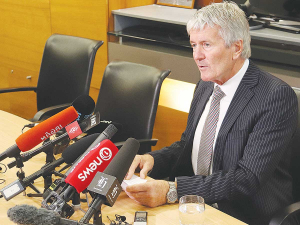Damien O’Connor: NZ united on global trade
When it comes to international trade, politicians from all sides of the aisle are united, says Labour's trade spokesman Damien O'Connor.
 Damien O'Connor's recent ban on live exports is an "irrational proposal, designed to appeal to urban voters, swayed by a lunatic fringe", according to Tim Gilbertson.
Damien O'Connor's recent ban on live exports is an "irrational proposal, designed to appeal to urban voters, swayed by a lunatic fringe", according to Tim Gilbertson.
OPINION: Damien! What were you thinking, banning the live export trade?
You looked earnest and deeply concerned. A worthy graduate of 'Sincerity School'. But it is an irrational proposal, designed to appeal to urban voters, swayed by a lunatic fringe.
Live exports, you say, threaten our trading reputation. From 1915 to 1918, the NZ Mounted Rifle Brigade shipped 10,000 horses to Egypt to fight the Turks. The loss rate was a miniscule 3%. So, we have been shipping successfully for years. The survival rate on shipments to China is 99.9%. How can that to our trading reputation, rather than a glowing endorsement?
Compared to most nations, we are shining stars. How many high-level complaints have you had (apart from Turkey in 1916 requesting we sent our horses home and fight on foot) about or live export trade? None.
The tragic consequences were brought home, says Damien, by the loss of 41 crew and 7,000 cattle last year when a ship went down in a typhoon. It sank because the engines failed and the boat went beam on to the waves and tipped over. Which, while indubitably tragic, was about cleaning the spark plugs rather than the rights and wrongs of the live export trade.
Once animals leaves our shores, we have little ability to ensure their wellbeing. That is unacceptable to us, says the Minister. Air export is okay because travel times are shorter, the animals are better looked after and the numbers are miniscule.
When do numbers involved, distance of travel and assumed quality of care become relevant factors that swing approval from sea to sky? The distinction is nonsense. The manner of travel is irrelevant.
No MPI officials went on the ships or to farms in China. None of them flew with animals to verify Damien's airborne assertions. Nor did they ask the expert opinion of anyone involved in the trade. The review was designed to give the answer Cabinet wanted. Cabinet, apart from you Damien, doesn't know the difference between a heifer and a hyena, so they signed off a travesty.
So, a major $300 - $500 million export industry is wiped out to please a miniscule, ill-informed minority. Who else gets the same treatment? Once more the message from the top is that rural NZ is insignificant, immaterial and irrelevant.
But don't fret. Because Damien says we now have an opportunity to boost trade through our cutting-edge scientific work into dairy cow genetics and germplasm use. So, there you go, all you thwarted live export wannabees. Sell your babies as bobby calves, set up a laboratory in the cowshed and whack out some cutting-edge scientific discoveries. Easy, peasy, lemon squeezy.
The real tragedy is that Damien is a nice, well-meaning bloke. I've met him, shaken his paw and held an amiable discourse. Many of them (politicians) are.
They just get caught up in the game and forget that their foolish, thoughtless actions have grave consequences in the real world.
So, be sincere and good, Damien. Abandon the dark side. Ban cigarettes. Ban Rio Tinto zinc. Ban Mike Hosking. Ban Auckland from stealing Waikato water and Pukekohe potato fields. Allow live exports and police them.
Shape up or ship out. If you ship out, make sure the engines are working and check the weather report.
Good luck, Damien. All the best from all of us here in drought land.
Tim Gilbertson is a Central Hawke's Bay Farmer.
The quest to find innovative practical, scientific solutions to deal with water-related issues at a catchment level has been the theme of an important conference at Massey University last week.
One of the country's top Māori farms faces a long and costly rebuild to get the property back to where it was before recent storms ripped through it.
The latest Global Dairy Trade auction results have delivered a boost to dairy farmers.
New Zealand potato growers are prioritising value creation from high yields to meet a complex mix of challenges and opportunities, says Potatoes NZ chief executive Kate Trufitt.
A Hawke's Bay apple orchardist supports the Government's objective of doubling exports but says this won't happen in the horticulture sector unless there's a change in the process for bringing new plant material into the country.
Canterbury arable farmers are down by tens of millions of dollars after a rollercoaster of wild changeable January weather saw harvests delayed and some crops destroyed by violent hailstorms.